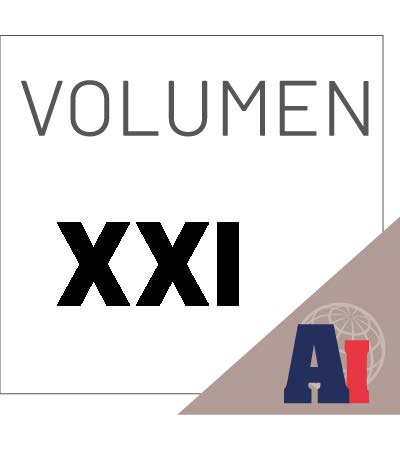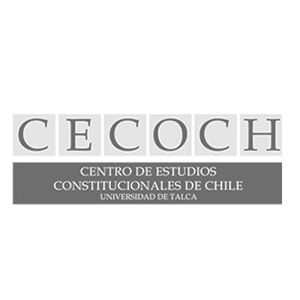Sanctioning International Terrorist Organizations (ITOs): The Changing Paradigm of International Legal Personality?
Este trabajo aborda el problema de la así llamada “guerra contra el terrorismo”, las sanciones de la ONU y la posible responsabilidad penal internacional de las organizaciones terroristas internacionales (OTI), y la influencia de las mismas en el concepto contemporáneo de “personalidad jurídica internacional”. De este modo, las OTI, como destinatarios de las normas jurídicas internacionales que incriminan el terrorismo y las sanciones por ese delito, adquieren algún tipo de capacidad jurídica internacional que podría llevar a su personalidad jurídica internacional.
Detalles del artículo
Uso de licencias Creative Commons (CC)
Todos los textos publicados por el Anuario Mexicano de Derecho Internacional sin excepción, se distribuyen amparados con la licencia CC BY-NC 4.0 Internacional, que permite a terceros utilizar lo publicado, siempre que mencionen la autoría del trabajo y la primera publicación en esta revista. No se permite utilizar el material con fines comerciales.
Derechos de autoras o autores
De acuerdo con la legislación vigente de derechos de autor el Anuario Mexicano de Derecho Internacional reconoce y respeta el derecho moral de las autoras o autores, así como la titularidad del derecho patrimonial, el cual será transferido —de forma no exclusiva— al Anuario para permitir su difusión legal en acceso abierto.
Autoras o autores pueden realizar otros acuerdos contractuales independientes y adicionales para la distribución no exclusiva de la versión del artículo publicado en el Anuario Mexicano de Derecho Internacional (por ejemplo, incluirlo en un repositorio institucional o darlo a conocer en otros medios en papel o electrónicos), siempre que se indique clara y explícitamente que el trabajo se publicó por primera vez en el Anuario.
Para todo lo anterior, deben remitir la carta de transmisión de derechos patrimoniales de la primera publicación, debidamente requisitada y firmada por las autoras o autores. Este formato debe ser remitido en PDF a través de la plataforma OJS.
Derechos de lectoras o lectores
Con base en los principios de acceso abierto las lectoras o lectores de la revista tienen derecho a la libre lectura, impresión y distribución de los contenidos del Anuario por cualquier medio, de manera inmediata a la publicación en línea de los contenidos. El único requisito para esto es que siempre se indique clara y explícitamente que el trabajo se publicó por primera vez en el Anuario Mexicano de Derecho Internacional y se cite de manera correcta la fuente incluyendo el DOI correspondiente.
Citas
Barberis, Julio A., “Nouvelles questions concernant la personnalité juridique internationale”, Recueil des Cours de l’Académie de Droit International de la Haye, vol. 179, issue I, 1983.
Berezowski, Cezary, “Les problèmes de la subjectivité internationale”, in Ibler, Vladimir (ed.), Mélanges offerts à Juraj Andrassy, La Haye, Martinus Nijhoff, 1968.
Brown, Davis, “Use of Force against Terrorism after September 11th: State Responsibility, Self-Defence and other Responses”, Cardozo Journal of International Law, New York, vol. 11, issue 1, 2003.
Brück, Otto, Les sanctions en droit international public, Paris, Pedone, 1933.
Byers, Michael, “Terrorism, the Use of Force and International Law after 11 September”, International and Comparative Law Quarterly, Cambridge, vol. 51, issue 2, 2002.
Byman, Daniel, “How to Handle Hamas. The Perils of Ignoring Gaza’s Leadership”, Foreign Affairs, New York, vol. 89, 2010.
Caflisch, Lucius et al. (eds.), Les sujets du droit international, vol. 3, Genoa, Librairie E. Droz, 1973.
Capotorti, Francesco, “Cours général de droit international public”, Recueil des Cours de l’Académie de Droit International de la Haye, vol. 248, issue IV, 1994.
Cheng, Bin, “Introduction”, in Bedjaoui, Mohammed (ed.), Droit international, Bilan et perspectives, vol. 1, Paris, Pedone-UNESCO, 1991.
Damrosch, Lori F., “Enforcing International Law through Non-Forcible Measures”, Recueil des Cours de l’Académie de Droit International de la Haye, vol. 269, 1997.
Dinstein, Yoram, War, Aggression and Self-Defence, 2nd ed. Cambridge, Cambridge University Press, 1995.
Enabulele, Amos O., “Use of Force by International/Regional Non-State Actors: No Armed Attack, No Self-Defense”, European Journal of Law Reform, Utrecht, vol. 12, issue 3-4, 2010.
Eustathiades, Constantin T., “Les sujets du droit international et la responsabilité internationale. Nouvelles tendances”, Recueil des Cours de l’Académie de Droit International de La Haye, vol. 84, issue III, 1953.
Feldman, David I., “International Personality”, Recueil des Cours de l’Académie de Droit International de la Haye, vol. 191, issue II, 1985.
Fortin, Katharine, The Accountability of Armed Groups under Human Rights Law, Oxford, Oxford University Press, 2017.
Fry, James D., “Terrorism as a Crime against Humanity and Genocide: The Backdoor to Universal Jurisdiction”, UCLA Journal of International Law and Foreign Affairs, Los Angeles, vol. 7, issue 1, 2002.
Gill, Terry D., “Just War Doctrine in Modern Context”, in Gill, Terry D. and Heere, Wybo P. (eds.), Reflections on Principles and Practice of International Law, The Hague-Boston-London, Martinus Nijhoff Publishers, 2000.
Guillaume, Gilbert, “Terrorisme et droit international”, Recueil des Cours de l’Académie de Droit International de la Haye, vol. 215, issue III, 1989.
Higgins, Rosalyn, “Conceptual Thinking About the Individual in International Law”, in Falk, Richard et al. (eds.), International Law. A Contemporary Perspective, Boulder, Westview Press, 1985.
Jennings, Robert and Watts, Sir Arthur (eds.), Oppenheim’s International Law, 9th ed., vol. 1, London, Longman, 1995.
Kelsen, Hans, General Theory of Law and State, Cambridge-Massachusetts, Harvard University Press, 1945.
Khdir, Rebaz, “The Right to Self-Defence in International Law as a Justification for Crossing Borders: The Turkey-PKK Case within the Borders of Iraq”, Russian Law Journal, Moscow, vol. IV, 2016.
Kotzsch, Lothar, The Concept of War in Contemporary History and International Law, Genoa, Librairie E. Droz, 1956.
Lapaš, Davorin, “Diplomatic Privileges and Immunities for IGO-Like Entities: A Step Towards a New Diplomatic Law?”, International Organizations Law Review, Leiden, vol. 16, issue 2, 2019.
Levi, Werner, Contemporary International Law: A Concise Introduction, Boulder, Westview Press, 1979.
Margulies, Peter and Sinnot, Matthew, “Crossing Borders to Target Al-Qaeda and Its Affiliates: Defining Networks as Organized Armed Groups in Non-International Armed Conflicts”, Yearbook of International Humanitarian Law, The Hague, Asser Press, vol. 16, 2015.
McDougal, Myres S., “International Law, Power, and Policy: A Contemporary Conception” Recueil des Cours de l’Académie de Droit International de la Haye, vol. 82, issue I, 1953.
Mégret, Frédéric, “«War»? Legal Semantics and the Move to Violence”, European Journal of International Law, Oxford, vol. 13, issue 2, 2002.
Mosler, Hermann, “Réflexions sur la personnalité juridique en droit international public”, in Baugniet, Jean (ed.), Mélanges offerts à Henri Rolin, Paris, Pedone, 1964.
Mosler, Hermann, “Subjects of International Law”, in Bernhardt, Rudolf (ed.), Encyclopedia of Public International Law, vol. 7, Amsterdam-New York-Oxford, North-Holland, 1984.
Mugerwa, Nkambo, “Subjects of International Law”, in Sørensen, Max (ed.), Manual of Public International Law, London-Melbourne-Toronto-New York, MacMillan-St. Martin’s Press, 1968.
Müllerson, Rein A., “Jus ad bellum and International Terrorism”, Israel Yearbook on Human Rights, Leiden-Brill, Nijhoff, vol. 32, 2002.
Müllerson, Rein A., “Legal Regulation of the Use of Force: The Failure of Normative Positivism”, in Borch, Fred L. and Wilson, Paul S., (eds.), International Law Studies, Newport-Rhode Island, Naval War College, vol. 79, 2003.
Nijman, Janne E., The Concept of International Legal Personality. An Inquiry into the History and Theory of International Law, The Hague, T.M.C. Asser Press, 2004.
Nowrot, Karsten and Schabacker, Emily W., “The Use of Force to Restore Democracy: International Legal Implications of the ECOWAS Intervention in Sierra Leone”, American University International Law Review, Washington D.C., vol. 14, 1998-1999.
Pellet, Alain and Tzankov, Vladimir, “Can a State Victim of a Terror Act Have Recourse to Armed Force?” Humanitäres Völkerrecht, Berlin, DRK-Service GmbH, Geschäftsbereich Verlag, vol. 17, 2004.
Portmann, Roland, Legal Personality in International Law, Cambridge, Cambridge University Press, 2010.
Quadri, Rolando, “Cours général de droit international public”, Recueil des Cours de l’Académie de Droit International de la Haye, vol. 113, issue III, 1964.
Reuter, Paul, Droit international public, Paris, Presses Universitaires de France, 1983.
Ruys, Tom, “Quo Vadit Jus ad Bellum? A Legal Analysis of Turkey’s Military Operations against the PKK in Northern Iraq”, Melbourne Journal of International Law, Melbourne, vol. 9, 2008.
Sailer, Todd M., “The International Criminal Court: An Argument to Extend Its Jurisdiction to Terrorism and a Dismissal of U.S. Objections”, Temple International and Comparative Law Journal, Philadelphia, Temple University James E. Beasley School of Law, vol. 13, 1999.
Scelle, Georges, Cours de droit international public, Paris, Éditions Domat-Montchrestien, 1948.
Shaw, Malcom N., International Law, 8th ed., Cambridge, Cambridge University Press, 2017.
Singh, Nagendra, “The Distinguishable Characteristics of the Concept of the Law as it Developed in Ancient India”, in Bos, Maarten and Brownlie, Ian (eds.), Liber Amicorum for Lord Wilberforce, Oxford, Clarendon Press, 1987.
Siu, Tchoan-Pao, Le droit des gens et la Chine antique, Paris, Jouve & Cie Éditeurs, 1926.
Taghi Karoubi, Mohammad, Just or Unjust War? International Law and Unilateral Use of Armed Force by States at the Turn of the 20th Century, Hants-Burlington, Ashgate, 2004.
Tams, Christian J., “The Use of Force against Terrorists”, European Journal of International Law, Oxford, vol. 20, 2009.
Tomuschat, Christian, “General Course of Public International Law”, Recueil des Cours de l’Académie de Droit International de La Haye, vol. 281, 1999.
Tunkin, Grigoriĭ I. (ed.), International Law, Moscow, Progress Publishers, 1986.
Von Liszt, Franz, Das Völkerrecht–systematisch dargestellt, Berlin, Verlag von O. Haering, 1902.
Vukas, Budislav, “States, Peoples and Minorities”, Recueil des Cours de l’Académie de Droit International de La Haye, vol. 231, issue VI, 1991.
Walsh, Frank M., “Rethinking the Legality of Colombia’s Attack on the FARC in Ecuador: A New Paradigm for Balancing Territorial Integrity, Self-Defense and the Duties of Sovereignty”, Pace International Law Review, White Plains NY, Pace University School of Law, vol. 21, 2009.
Walter, Christian, “Subjects of International Law”, in Wolfrum, Rüdiger (ed.), The Max Planck Encyclopedia of Public International Law, vol. IX, Oxford, Oxford University Press, 2012.
Yihdego, Zeray W., “Ethiopia’s Military Action against the Union of Islamic Courts and Others in Somalia: Some Legal Implications”, International and Comparative Law Quarterly, Cambridge, vol. 56, 2007.
Zimmermann, Andreas, “The Second Lebanon War: Jus ad bellum, jus in bello and the Issue of Proportionality”, Max Planck Yearbook of UN Law, Leiden-Boston, Martinus Nijhoff Publishers, vol. 11, 2007.































